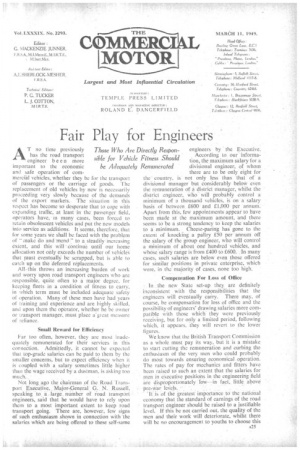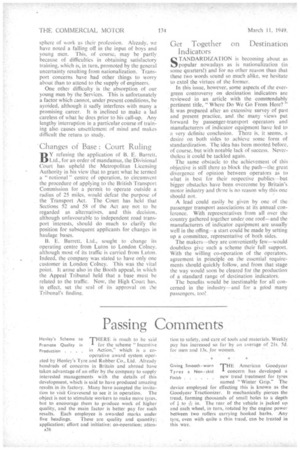Fair Play for Engineers
Page 1

Page 2

If you've noticed an error in this article please click here to report it so we can fix it.
Those Who Are Directly Responsible for Vehicle Fitness Should be Adequately Remunerated AT no time previously has the road transport engineer been more important to the economic and safe operation of corninercial vehicles, whether they be for the transport of passengers or the carriage of goods. The replacement of old vehicles by new is necessarily proceeding very slowly because of the demands of the export' markets.. The situation in this respect has become-so. desperate that to cope with expanding traffic; at least in the passenger field, operators have; in many cases, been forced to retain obsolescent. vehicles and put the new models into service as additions-. It seems, therefore, that for some years We shall be.faced with the problem of make do and mend-to a steadily:increasing extent, and this will 'continue until our home allocation not only exceeds the number of Vehicle's that must eventually be scrapped, but is able to catch up on the deferred replacements.
All-this throws an increasingburden of work and worry upon road transport engineers who are responsible, quite often to a major degree, for keeping fleets in a condition of fitness to carry; in which term must be included adequate safety of operation. Many of these men have had years of training and experience and are highly skilled, and upon them the operator, whether he be owner or transport manager, must place a' great measure of reliance.
Small Reward for Efficiency
Far too often, however, they are most inadequately remunerated for their services in this connection. Admittedly, it cannot be expected that top-grade salaries can be paid tf....) them by the smaller concerns, but to expect efficiency when it is coupled With a salary sometimes little higher than the wage received by a dustman, is sking too much.. . . . .
Not long ago the chairman of the Road T.rans7 port' 'Executive, , Major General q.; N. RusSell, . speaking to a large, ntiMber of road transport engineers, said that he would have to rely upon them to a 1110st important extent to keep road transport going. There are, however, few signs of such enthusiasm .shown in connection with 'the salaries which Are being offered to these self-same engineersby the Executive. . According to our 'information, the maximima salary for a divisional engineer,' of whom there are to be only eight for the country, is not only less than that of a divisional manager' but considerably beloW even the remuneration of a district manager, whilst the district engineer, who will probably control a minimum of a thousand vehiales, is on -a salary basiS of between. £600 and £1,000 per 'annum. Apart from this, feW appointmentsappear to have been rriade At the maximum amount, and there seems to be a strong tendency to keep the salaries to a mininium. . Cheese-paring hag gone to the extent of knocking a paltry £50 per annum off the Salary of the 'group engineer, who will control a rilinimia11 of about One hundred vehicles, and whoSe'salary range is from £400 to £600. In many cases, such' salaries are below even those offered for. similar positions in private enterprise, which were, in the majority of cases, none too high.
Compensation For Loss of Office
in . the new State set-up they are definitely inconsistent with the responsibilities that the engineers will eventually carry. There may, of course, be compensation for loss of office and the possibility of engineers' drawing salaries more compatible with those which they were previously receivim bin for only a limited period, following which, it appears, they will revert to the lower figures.
We know that the British Transport Commission as a whole must pay its way, but it is a mistake to start cutting the remuneration and curbing the enthusiasm of the very men who could probably do most towards ensuring economical .operation. The rates of pay for mechanics and fitters have been raised to such an extent that the salaries for men in executive positions in the engineering field are disproportionately low---.in fact,. little above pre-war leVels. . „. . 'lt..is of the greatest importance' to thenational economy that the standard of earnings of the road transport engineer should be raised to a justifiable level, if this be not carried out, the quality of the men and their work will deteriorate, whilst there will be no encouragement to youths to choose this sphere of work as their profession. Already, we have noted a falling off in the input of boys and young men. This, of course, may be partly because of difficulties in obtaining satisfactory training, which is, in turn, promoted by the general uncertainty resulting from nationalization. Transport concerns have had other things to worry about than to attend to the supply of engineers.
One other difficulty is the absorption of our young men by the Services. This is unfortunately a factor which cannot, under present conditions, be ayoided, although it sadly interferes with many a promising career. It is inclined to make a lad careless of what he does prior to his call-up. Any lengthy interruption in a particular course of training also causes unsettlement of mind and makes difficult the return to study.
'Changes of Base : Court Ruling
-D Y refusing the application of B. E. Barrett, 1.11 Ltd., for an order of mandamus, the Divisional Court has upheld the Metropolitan Licensing Authority in his view that to grant what he termed a " notional" centre of operation, to circumvent the procedure of applying to the British Transport Commission for a permit to operate outside a radius of 25 miles, would defeat the purpose of the Transport Act. The Court has held that Sections 52 and 58 of the Act are not to be regarded as alternatives, and this decision, although unfavourable to independent road transport 'interests, should do much to clarify the position for subsequent applicants for changes in haulage bases.
B. E. Barrett, Lid., sought to change its operating centre from Luton to London Colney. although most of its traffic is carried from Luton. Indeed, the company was stated to have only one customer in London Colney, This was the vital point. It arose also in the Booth appeal, in which the Appeal Tribunal held that a base must be related to the traffic. Now, the High Court has, in effect, set the seal of its approval on the Tribunal's finding.
Get Together on Destination Indicators
TANDARDIZATION is becoming about as popular nowadays as is nationalization (ill some quarters!) and for no other reason than that these two words sound so much alike, we hesitate to extol the virtues of the former.
In this issue, however, some aspects of the evergreen controversy on destination indicators are reviewed in an article with the commendably pertinent title. "Where Do We Go From Here? " It was prepared after an extensive survey of past and present practice, and the many views put forward by passenger-transport operators and manufacturers of indicator equipment have led to a very definite conclusion. There is, it seems, a desire on both sides to achieve some form of standardization. The idea has been mooted before, of course, but with notable lack of success. Nevertheless it could be tackled again.
The same obstacle to the achievement of this objective is still there to block the path—the great divergence of opinion between operators as to what is best for their respective publics—but bigger obstacles have been overcome by Britain's, motor industry and tlra-e is no reason why this one should not.
A lead could easily be given by one of the passenger transport associations at its annual conference. With representatives from all over thecountry gathered together under one roof—and the manufacturers of indicator equipment are usually well in the offing—a start could be made by setting up a committee, representative of both sides.
The makers—they are conveniently few—would doubtless give such a scheme their full support. With the willing co-operation of the operators, agreement in principle on the essential requiretnents should quickly follow, and from that stage the way would soon be cleared for the production of a standard range of destination indicators.
The benefits would be inestimable for all concerned in the industry—and for a gdod many passengers, too!


























